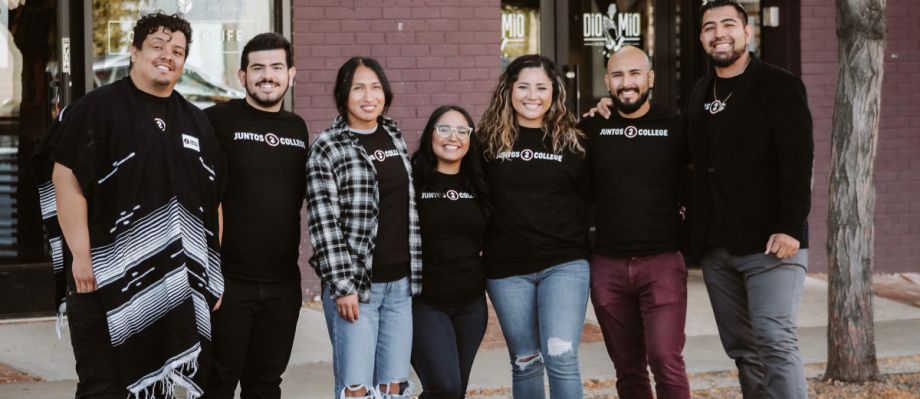Helping DREAMers navigate DACA renewals to support themselves and their families

AnnaStills // Shutterstock
Helping DREAMers navigate DACA renewals to support themselves and their families
person submitting legal documents across desk
Luis Antezana was born in Bolivia, raised in Los Angeles, and, as he likes to say, “professionally adopted” by Colorado through his work as a teacher. Brought to the country as an undocumented minor, Antezana was nearing the end of his time in college in Los Angeles in June 2012 when then-President Barack Obama announced a long-awaited lifeline for DREAMers like him.
The Deferred Action for Childhood Arrivals program (DACA) does not create a pathway to citizenship. But it temporarily shields recipients from deportation and allows them to get work permits.
“With DACA, I had every reason to graduate so that I could exercise my degree,” Antezana (pictured) tells Next City. That’s exactly what he did when he received an offer to teach in Colorado Springs upon graduation. He spent three years teaching high schoolers before taking a counselor job with Denver Public Schools.
Antezana was tasked specifically with helping seniors prepare for life after high school. Three years into that, he hit a ceiling. His students were 90% Latinx and predominantly low-income. Without the full-ride scholarships that went to students in the top 10% of their class, the majority of his undocumented students were unable to afford to go to college. Getting DACA isn’t always easy and, as first-generation students, many were preoccupied by the need to work to support their families.
Antezana started exploring the viability of alternative pathways to legal employment for his undocumented students through contracting and developing their own businesses. “But as I was figuring those things out, it became clear that it wasn’t a priority for the district or my school’s leadership at the time,” Antezana says. So he stepped up to the plate.
![]()

Juntos Community
Seizing an opportunity to step in where others would not, Antezana launched a nonprofit to help DREAMers like himself
Luis Antezana, far right, and the rest of the Juntos Community team
photo: Luis Antezana, far right, with the rest of the Juntos Community team
With the validation of performing well in a contest for education-focused technological innovations in 2019 and a $2,000 grant in 2020, Antezana launched Juntos Community, a Denver-based nonprofit that supports DACA recipients, DREAMers, and their families.
Juntos (pictured above with Antezana at the far right) does this in two main ways: First, it helps undocumented immigrants who are eligible for DACA to both receive authorization from the federal government as well as renew their authorization every two years in order to live and work legally in the United States.
Juntos accomplishes this through its DACAWorks program, which Antezana describes as “a legal service blended with teaching over a virtual platform.” DACA applications and renewals involve complex legal forms. DREAMers are left to either muddle through the labyrinthian process themselves or hire legal help — on top of the $495 renewal fee, often a hardship by itself.
DACAWorks not only ensures that each application and renewal is correctly filled out so that it won’t be rejected, but it teaches DREAMers how to do it themselves moving forward, eliminating the need for costly legal assistance. Plus, Juntos offers grants to DREAMers who can’t afford the $495 fee.
The second way that Juntos Community helps its members is by connecting them to work opportunities so they can earn the money they need to live, support their families and build generational wealth. “I have been building relationships with employers in five particular industries: government, tech, health, education, and finance,” Antezana says.
Juntos works to aggregate job opportunities through emails, newsletters, listservs and more from employers in those industries and disseminates them through Juntos’ exclusive WhatsApp group that serves as a job board. “Our goal is to create a group where we can share curated, paid opportunities that will help our DACA recipients increase their wages not in stereotypical industries like hospitality and construction,” Antezana adds.
Juntos’ impact is “really important for DACA recipients because [DACA is] how they can keep their jobs and keep earning their wages and use their wages to help themselves and their families,” Antezana says.
Monse Jiménez, a 25-year-old DACAWorks user, agrees.
Today, she works at the nonprofit Servicios de La Raza to provide culturally responsive behavioral health services in partnership with Denver Public Schools. But four years ago, when she needed to file her DACA renewal, “I was a college student going to school full time and working full time. I was really just getting by,” Jiménez recalls.
“The first time, when I renewed without Juntos, it was super stressful. Anything that has to do with paperwork regarding the government and especially immigration is very difficult.”
Because she didn’t send in a check for the right amount to cover the fees, her first renewal application was rejected – and she didn’t have the funds to reapply.
Then Jiménez learned about Juntos and DACAWorks from Juntos’ DACAWorks program manager, Fryda Faugier Ferreira. Juntos provided a grant to cover the cost of reapplying and, through DACAWorks, walked her through the process to a successful renewal.
“Compared to the time I did it with DACAWorks, they guided me through every single part of the application and continuously checked in on me to see if I needed help with anything. They were even able to take my passport picture, so I didn’t have to pay for that out of pocket either,” Jiménez says.
For her, what Juntos offers extends far beyond just helping with government paperwork. “I find myself often having to even explain to people what DACA is. So to go to a place where people know what it’s about and have gone through similar struggles, it’s always refreshing to be in a space where I’m around people who understand it,” she says.
Most recently, Juntos helped connect Jiménez with an attorney to submit her Advanced Parole application to leave the country. Should it be approved, she’s going to visit her and her parent’s homeland in Guadalajara, México.
“It’s been 21 years since I’ve been in my home country,” she explains. “If I do get my permit, I’m going to go visit because my grandparents have passed away. I want to be able to say my goodbyes, meet family that I haven’t met before, and learn about where I’m from.”
This story was produced by Next City, a nonprofit newsroom covering solutions for equitable cities, and reviewed and distributed by Stacker Media.